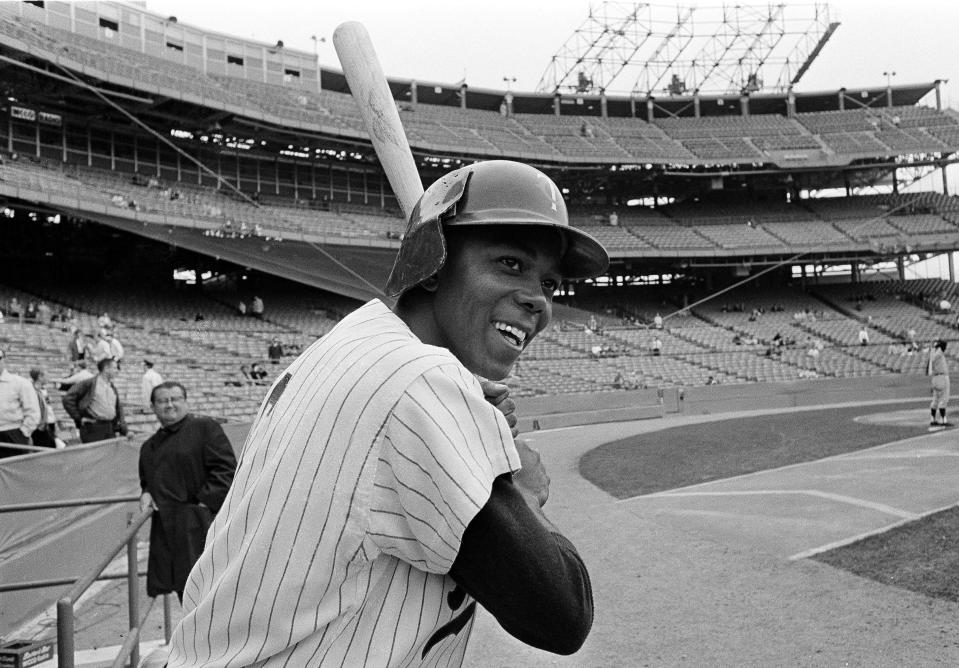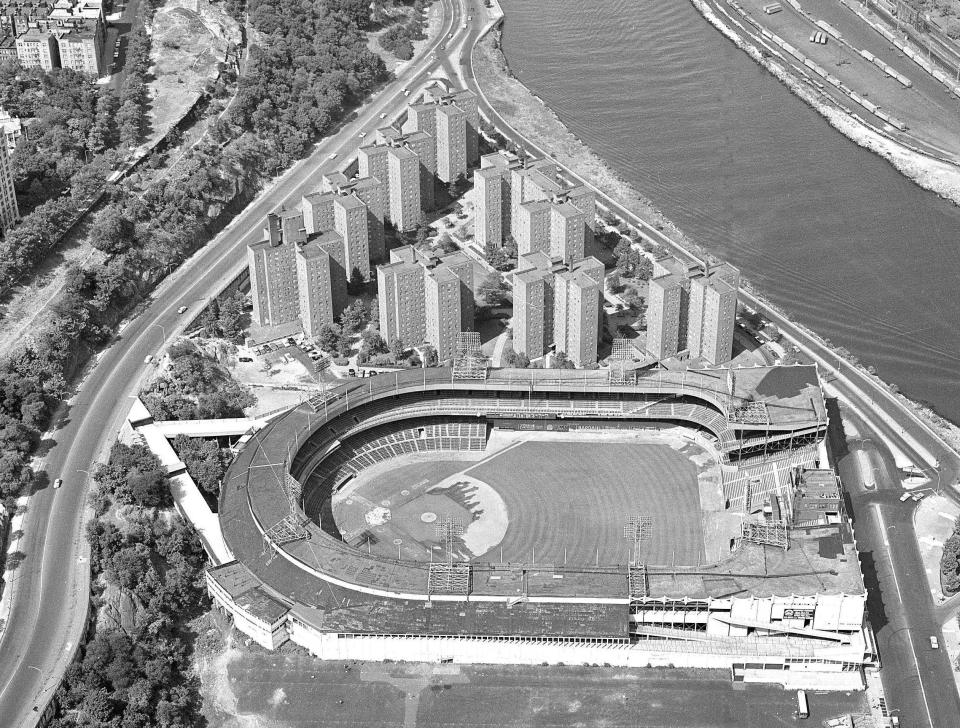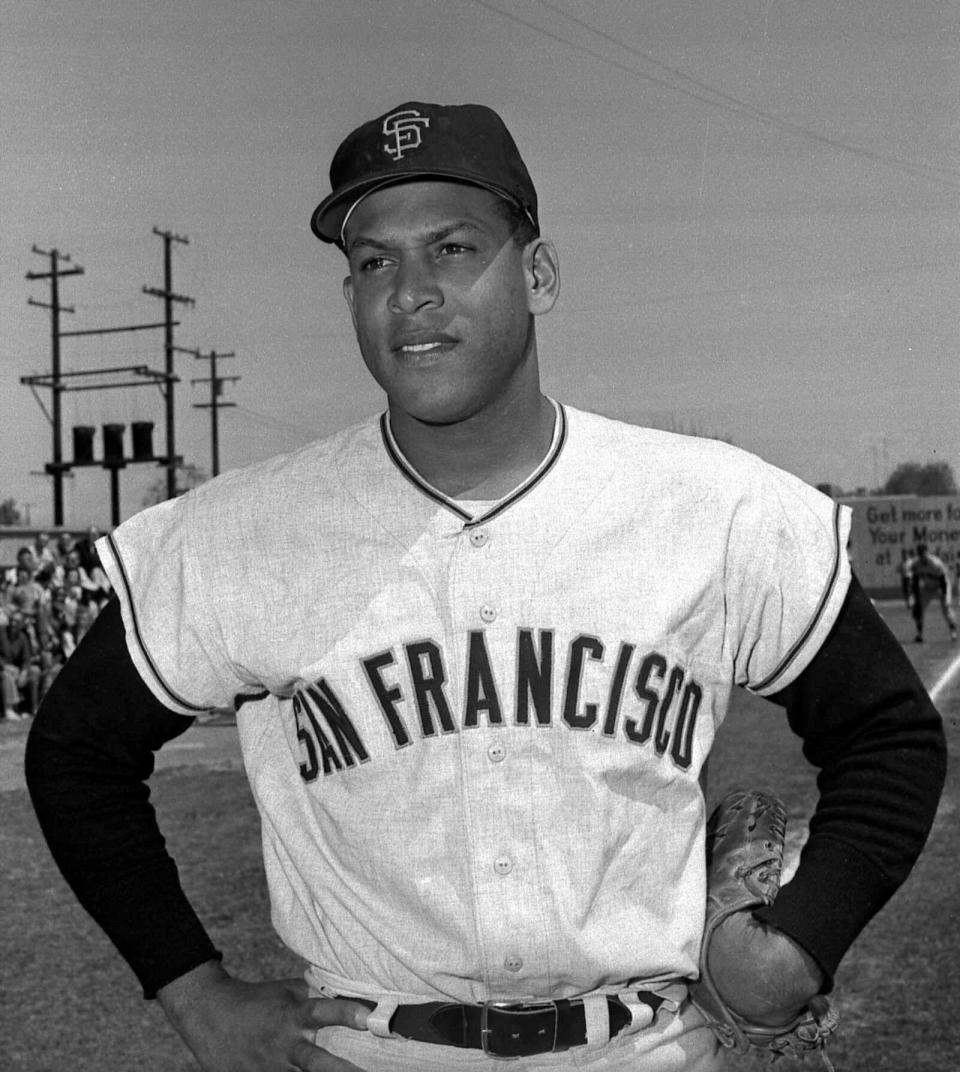Polo Grounds' baseball finale was 'Latino All-Star Game': 'Have to honor their own'
Pregame festivities featured a hall of fame induction ceremony, a home run derby competition and music performed by three of the biggest Latino entertainers at that time.
Four future Hall of Famers, several current All-Stars and other future stars dotted both rosters. And one team was managed by Roberto Clemente.
Almost a month after the last major-league game was played at the Polo Grounds in 1963, the historic ballpark situated between the Harlem River and Coogan's Bluff in upper Manhattan played host to one final baseball game — featuring two teams made up almost entirely of Latino major leaguers.
Cuban-born Tony Oliva was just 24 with a grand total of 16 major-league at-bats in two seasons with the Minnesota Twins but found himself among the Latino giants of the game: future Hall of Famers Clemente, Orlando Cepeda, Juan Marichal and Luis Aparicio, among others.
BEST ALL-LATINO LINEUPS: Dominican Republic | Venezuela | Cuba | Puerto Rico | Mexico | Panama | Rest of Latin America
'OUR JACKIE ROBINSON': Minnie Miñoso's legacy lives on for Black Latino players
"I went because I was invited," said Oliva, who went on to become an eight-time All-Star and three-time American League batting champion. "I finished that year in the majors. I started at Triple-A and finished in the big leagues. And they invited me. I don’t know why they invited me, because in that game were the pure horses of the big leagues. There was Clemente, Cepeda, Julio Bécquer, (Zoilo) Versalles, many of the (Latino) players from the big leagues and some Latino kids like me who were in the big leagues that year, but 99 percent of them were the big leaguers."

Despite his inexperience, Oliva went 2-for-5 with an RBI, but his AL squad fell to the Clemente-managed National League team 5-2 as countryman Pedro Ramos of Cleveland surrendered four earned runs despite striking out eight. The San Francisco Giants' Marichal, who had tied Sandy Koufax with an NL-leading 25 wins that season, struck out six in four shutout innings for the victory.
"It was historic," the Dominican-born Marichal said when recalling the game to the New York Daily News in 2013. "There was a lot of emotion among all the players, and you could tell the fans were excited about it, too."
Official attendance for the game, held on Saturday, Oct. 12, 1963, was 14,235, well below the Polo Grounds' capacity of 56,000 but far better than the 1,752 fans who watched the New York Mets lose their final home game at the Polo Grounds on Sept. 18 en route to a 111-loss season.
The contest, held on Columbus Day, was organized to benefit the Hispanic-American Baseball Federation, which provided baseball equipment to youth players.
But the game also was used to establish the Latin American Baseball Players' Association Hall of Fame, inducting four players — Cuban-born Adolfo Luque and Puerto Ricans Hiram Bithorn, Pedro "Perucho" Cepeda and Francisco "Pancho" Coimbre — in its inaugural class.
"They wanted to start a Hall of Fame to honor Latino ballplayers, and part of it was recognizing, I believe, that MLB or the sports writers were not going to give them their due, that they were going to have to honor their own," said Adrian Burgos Jr., a professor of history at the University of Illinois and the founding editor-in-chief of La Vida Baseball website.

Luque (194-179, 3.24 ERA in 20 MLB seasons) was the first Latino to appear in a World Series (for the Cincinnati Reds in 1919 against the Chicago "Black Sox") and the first Latino to win a Series game (the clinching Game 5 in 1933 for the New York Giants against the Washington Senators).
Bithorn, for whom the baseball stadium in San Juan is named, in 1942 became the first Puerto Rican-born player to reach the majors. Coimbre, a star in the Puerto Rican league, also played in the Negro leagues with the New York Cubans. And Cepeda, Orlando's father, played on the famed 1937 Ciudad Trujillo team in the Dominican Republic that included Negro league stars and future Hall of Famers Satchel Paige, Josh Gibson and Cool Papa Bell.
Orlando Cepeda accepted on behalf of his father and was also voted the most popular Latino player the majors. Marichal was named the top Latino pitcher. Puerto Rican-born Vic Power of the Minnesota Twins was named the top Latino player.
"It was an amazing feeling having my father involved in that day," Cepeda told MLB.com in June. "It really brought tears to my eyes."

The pregame home-hitting contest was won by the AL as Power and Panamanian-born New York Yankees outfielder Héctor López — the AL manager — each homered with Dominican-born Giants outfielder Felipe Alou delivering the NL's only home run.
And there was the music, performed by New York-born bandleader Tito Puente, Puerto Rican bandleader Tito Rodríguez and Cuban singer La Lupe.
"When you consider the legendary players involved and the legendary musicians who performed," Ralph Paniagua, a Latin music promoter and founder of LatinoBaseball.com, told the Daily New, "it was just such an amazing and historic day for the Latino culture that we'll probably never see again."
Indeed, it was the one and only "Latino All-Star Game" as well as the only Latin American Baseball Hall of Fame induction.
"Even though ultimately that Hall of Fame does not come into being," Burgos said, "it’s fascinating that in 1963 they (Latino players) realized that those here in the United States would have a hard time understanding what they are going through to be big leaguers."
That was a time when Latinos were just beginning to make a significant impact in the majors. It was not until 1967 that Latino representation in the majors reached 10 percent, compared to about 25 percent in recent years (based on opening day rosters).
1965 All-Star game had 8 Latino players--Mantilla, Clemente, Oliva, Rojas, Marichal, Versalles, Davalillo, and Cardenas pic.twitter.com/x1LUayY2re
— John Bateman (@JohnnyBateman7) May 30, 2017
In fact, there were not quite enough Latin American-born players to fill out both rosters in 1963. Two players from the U.S. Virgin Islands — Al McBean and Joe Christopher — were on the NL roster. And with no NL catchers born in Latin America that season, the NL turned to Cuno Barragán, a California-born son of Mexican immigrants who had only one at-bat that season; and Italian-American Joe Pignatano, who played in Triple-A that year and never played in the majors again after 1962.
None of that mattered.
"It didn't matter that it was for charity and that it wasn't a 'real' all-star game," Cepeda said in 2013. "When you put on your uniform, you played hard and you tried even harder to win. And that's what everybody did in that game."
This article originally appeared on USA TODAY: 'Latino All-Star Game' in 1963 was Polo Grounds' baseball finale

